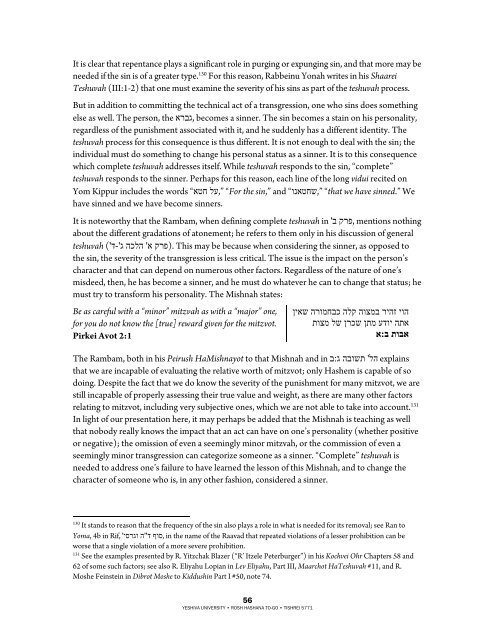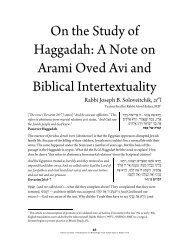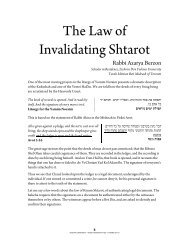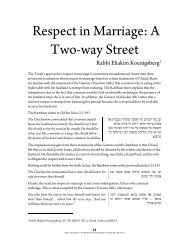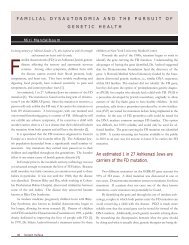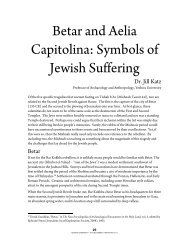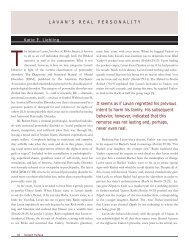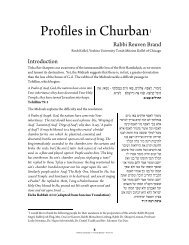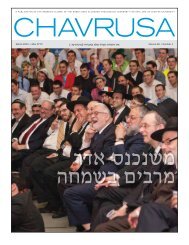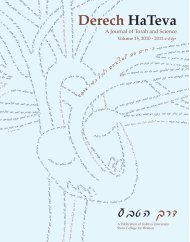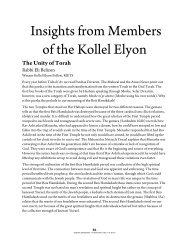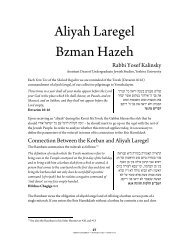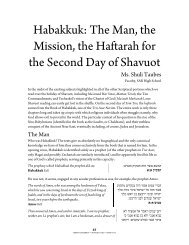YESHIVA UNIVERSITY • ROSH HASHANA TO-GO ... - YUTorah.org
YESHIVA UNIVERSITY • ROSH HASHANA TO-GO ... - YUTorah.org
YESHIVA UNIVERSITY • ROSH HASHANA TO-GO ... - YUTorah.org
You also want an ePaper? Increase the reach of your titles
YUMPU automatically turns print PDFs into web optimized ePapers that Google loves.
It is clear that repentance plays a significant role in purging or expunging sin, and that more may be<br />
needed if the sin is of a greater type. 130 For this reason, Rabbeinu Yonah writes in his Shaarei<br />
Teshuvah (III:1-2) that one must examine the severity of his sins as part of the teshuvah process.<br />
But in addition to committing the technical act of a transgression, one who sins does something<br />
else as well. The person, the ארבג, becomes a sinner. The sin becomes a stain on his personality,<br />
regardless of the punishment associated with it, and he suddenly has a different identity. The<br />
teshuvah process for this consequence is thus different. It is not enough to deal with the sin; the<br />
individual must do something to change his personal status as a sinner. It is to this consequence<br />
which complete teshuvah addresses itself. While teshuvah responds to the sin, “complete”<br />
teshuvah responds to the sinner. Perhaps for this reason, each line of the long vidui recited on<br />
Yom Kippur includes the words “אטח לע,” “For the sin,” and “ונאטחש,” “that we have sinned.” We<br />
have sinned and we have become sinners.<br />
It is noteworthy that the Rambam, when defining complete teshuvah in ' ב קרפ,<br />
mentions nothing<br />
about the different gradations of atonement; he refers to them only in his discussion of general<br />
teshuvah ( ' ד-'ג<br />
הכלה 'א<br />
קרפ).<br />
This may be because when considering the sinner, as opposed to<br />
the sin, the severity of the transgression is less critical. The issue is the impact on the person’s<br />
character and that can depend on numerous other factors. Regardless of the nature of one’s<br />
misdeed, then, he has become a sinner, and he must do whatever he can to change that status; he<br />
must try to transform his personality. The Mishnah states:<br />
Be as careful with a “minor” mitzvah as with a “major” one,<br />
for you do not know the [true] reward given for the mitzvot.<br />
Pirkei Avot 2:1<br />
56<br />
<strong>YESHIVA</strong> <strong>UNIVERSITY</strong> <strong>•</strong> <strong>ROSH</strong> <strong>HASHANA</strong> <strong>TO</strong>-<strong>GO</strong> <strong>•</strong> TISHREI 5771<br />
ןיאש הרומחבכ הלק הוצמב ריהז יוה<br />
תוצמ לש ןרכש ןתמ עדוי התא<br />
א:<br />
ב תובא<br />
The Rambam, both in his Peirush HaMishnayot to that Mishnah and in ב : ג הבושת 'לה<br />
explains<br />
that we are incapable of evaluating the relative worth of mitzvot; only Hashem is capable of so<br />
doing. Despite the fact that we do know the severity of the punishment for many mitzvot, we are<br />
still incapable of properly assessing their true value and weight, as there are many other factors<br />
relating to mitzvot, including very subjective ones, which we are not able to take into account. 131<br />
In light of our presentation here, it may perhaps be added that the Mishnah is teaching as well<br />
that nobody really knows the impact that an act can have on one’s personality (whether positive<br />
or negative); the omission of even a seemingly minor mitzvah, or the commission of even a<br />
seemingly minor transgression can categorize someone as a sinner. “Complete” teshuvah is<br />
needed to address one’s failure to have learned the lesson of this Mishnah, and to change the<br />
character of someone who is, in any other fashion, considered a sinner.<br />
130 It stands to reason that the frequency of the sin also plays a role in what is needed for its removal; see Ran to<br />
Yoma, 4b in Rif, ' יסרגו ה"<br />
ד ףוס,<br />
in the name of the Raavad that repeated violations of a lesser prohibition can be<br />
worse that a single violation of a more severe prohibition.<br />
131 See the examples presented by R. Yitzchak Blazer (“R’ Itzele Peterburger”) in his Kochvei Ohr Chapters 58 and<br />
62 of some such factors; see also R. Eliyahu Lopian in Lev Eliyahu, Part III, Maarchot HaTeshuvah #11, and R.<br />
Moshe Feinstein in Dibrot Moshe to Kiddushin Part I #50, note 74.


